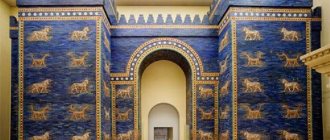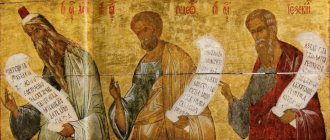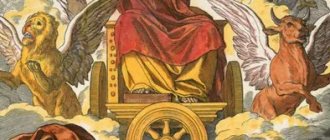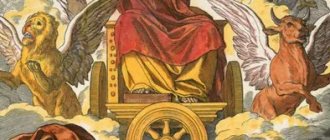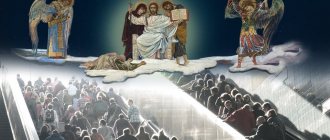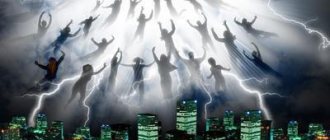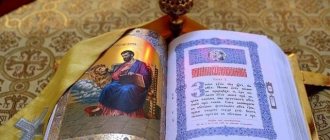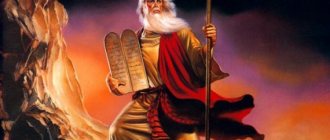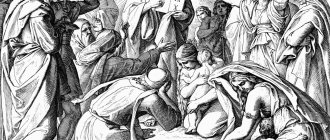"Save me, God!".
Thank you for visiting our website, before you start studying the information, please subscribe to our Orthodox community on Instagram, Lord, Save and Preserve † - https://www.instagram.com/spasi.gospodi/. The community has more than 60,000 subscribers. There are many of us like-minded people and we are growing quickly, we post prayers, sayings of saints, prayer requests, and timely post useful information about holidays and Orthodox events... Subscribe. Guardian Angel to you!
Biblical prophets and their biblical prophecies are predictions of certain events in the holy Book, spoken on behalf of the Lord by special people and intended for others. Often, a prophecy is considered not only a tale about the future, but also any truth set forth by God in the form of instructions and transmitted through the prophets. Read more about the names of biblical prophets and their prophetic words later in the article.
Above time
King David.
Gentile da Fabriano. 1370–1427 — In the popular imagination, a prophet is a predictor of the future. Is this true of the biblical prophets?
- Let's start from this word itself. Slavic prophet
- this is the one who
prophesies
.
But what exactly does it prophesy? Not necessarily the future. We can talk about revealing some secrets of the present and past, about the true meaning of certain events and human actions. If we take an interest in how this word appeared in the Slavic text of the Bible, we will see that this is a translation of the Greek prophetes
(προφήτης), where it really has the connotation of “prosecutor”, “soothsayer”, that is, it is associated with predicting the future.
However, if we turn to the Hebrew text of the Holy Scriptures, it turns out that the Hebrew word navi
, referring to the biblical prophets, is primarily “called”, “herald”.
If you look at the content of the Old Testament prophecies, it turns out that not all of them spoke about the future. Much more often it was about the present and the past - or rather, about understanding the past, about how this past is seen by God, Who speaks through the mouth of the prophets. And this is the key point. The most important thing in the activities of prophets is the proclamation of the will of God to their contemporaries.
Of course, they also prophesied the future. But here we need to understand this: our very idea of time follows from the nature of our created world. We, beings created by God, live in the flow of time, but God Himself is outside this flow. For Him, what appears to us as past, present and future is always “here and now.”
Man, nevertheless, even in his fallen state, is involved in the spiritual world - a world in which time does not have such an irresistible power. Therefore, when God reveals His will through the prophets, He, as it were, removes them from the flow of time, and for them the past, present and future merge to some extent. A prophet may proclaim something that is yet to come true, but for him, at the moment of pronouncing the prophecy, it has already come true and he talks about it as if it happened.
At the same time, note that the prophet does not set himself the goal of finding out the future and satisfying the curiosity of his contemporaries; he does not pierce time with his power. This happens to him solely by the will of God and solely in order to announce to people something very important for the salvation of all mankind - both the prophet’s contemporaries and their distant descendants.
Therefore, the very approach inherent in modern mass consciousness is incorrect - to isolate in prophecies only predictions of the future and consider them the main content of prophetic service.
- Well, what is the reason for this approach?
- Apparently, this is a human reaction to dependence on time. We live in a created world where time exists, we float in its flow and we can’t do anything about it, but the awareness of this fact depresses us, we feel helpless in relation to fleeting time, it’s hard for us to think that nothing can be changed in the past and that our future is unknown. This is where the desire to overcome the power of time is born - and since nothing can be done with the past, then at least find out the future. This, I think, is the psychological roots of such an intense interest in soothsayers and fortune-tellers.
Nahum
The name means "comforted". He preached in Judea under King Hezekiah (725-696 BC), and perhaps also under the wicked king Manasseh. His book also contains a prophecy about Nineveh. This time the city did not repent, as from the preaching of Jonah, and in 612 BC, after a two-month siege by the Babylonian king Nabopolassar, Nineveh fell. Although the defenders of Nineveh were superior in strength to the Babylonians, a plague suddenly broke out among them. The Babylonians entered the city, which was given to them by the wrath of God, almost without a fight.
Prophecies about Christ from the prophet Nahum:
The fate of Nineveh is an image of the final destruction of evil after the Second Coming of Christ.
Course correction
— Is prophetic ministry a specific stage in history aimed at preparing people for the coming of Christ, or have there always been prophets and will they always be?
— If we are talking about God’s chosen people, then, undoubtedly, prophetic ministry is a definite milestone in their history. And this service has a direct connection with changes in the political structure of Israeli society, with certain formations. First there was the tribal period, the period of the patriarchs - Abraham, then his children and grandchildren. Each such patriarch, the head of the clan, was directly responsible before God for his fellow tribesmen and proclaimed His will to them. Then the period of bright spiritual leaders - the period of judges, then - the period of the kings of Israel. Each such stage of Jewish history corresponded to its own, so to speak, mechanism of prophetic ministry.
Undoubtedly, Abraham, Isaac, and Jacob, also known as Israel, were prophets. They were in communion with God and revealed the will of God to their children and households - of which, in fact, the entire Jewish people at that time consisted. Jacob, dying, sang a song to his twelve sons, in which he prophetically destined the fate of the twelve tribes of Israel descended from them (Gen. 49
:1—29).
But during the period of the Kingdoms, so to speak, “professional” prophetic ministry begins. When the people of Israel received external forms of government the same as those of all other nations - that is, a monarchy - two spiritual dangers arose. Firstly, this is the danger of sliding into paganism (especially in the era of the division of the Jewish kingdom into northern and southern), and secondly, the danger of a purely formal, legalistic faith - something that the Lord Himself denounced through the prophet Isaiah: And the Lord said: since this the people draw near to Me with their lips, and with their tongues they honor Me, but their hearts are far from Me, and their reverence for Me is the study of the commandments of men.
(Isaiah
29:13
). Therefore, to preserve a living faith, it was no longer enough to simply observe the commandments and liturgical rituals - a constant “course correction” was required, a constant reminder of what the Lord really wants, what He is leading his people to. And God proclaimed His will precisely through the prophets - “professionals”.
This time—the Age of Kings—was truly the heyday of prophetic ministry. Based on the biblical narrative, we can even talk about a prophetic school, about prophetic succession, about some kind of regular reproduction of prophets. But gradually, especially after the return of the Jews from captivity, at the end of the Jewish canon of the Holy Scriptures, several centuries before the birth of Christ, the prophetic ministry came to naught. Even the Jewish theory of “prophetic silence” appeared. Hence such an acute experience of the ministry of John the Baptist, about which the Jews painfully pondered: who is he? If he is not the Messiah, then is he not a prophet? After all, it was believed that immediately before the appearance of the Messiah this prophetic silence should be broken and a new prophet should appear. Therefore, for the Jews of that time, John the Baptist marked a new era, the era of the fulfillment of messianic aspirations.
—Who were these people who became prophets during the era of the Kingdoms? Were they initially bright, outstanding personalities, with powerful, as they would say now, charisma, or did the Lord choose a variety of people for this service?
“Here, of course, the secret of human personality is revealed. What is in a person’s heart is seen only by God, and this cannot always be assessed from the outside. For example, the first of those anointed to the kingdom, Saul, was a man in whom those around him could not possibly assume a prophetic gift. The Bible even tells us that a proverb arose: “Is Saul also among the prophets?” (1 Samuel 10
:12).
It is important to note the following here: a prophet is always a person called
. The authors of prophetic books in their writings specifically stipulate the moment of their election. As a rule, it is associated with some extraordinary phenomena, visions, signs, or the direct, clearly sounding voice of God pointing to something. Let us recall Pushkin’s poem “The Prophet” - a direct poetic exposition of an excerpt from the book of the prophet Isaiah.
At the same time, very different people became prophets. These could be kings (like Saul, David, Solomon), or they could be shepherds (like Amos), they could be learned people (like Isaiah), or they could be not particularly educated, but there is something huge and mysterious in the personality of each prophet beyond the scope of rational comprehension.
Moreover, the Lord did not immediately call these people to prophetic service. For example, he called Moses only after he had been “taught in all the wisdom of Egypt” for forty years, and then lived another forty years as a stranger in the land of Midian (Acts 7
:22, 23, 30). That is, the Lord prepared His prophets for prophetic service throughout the entire course of their lives. He had a special Providence for each of them.
— Is it true that when the Old Testament prophets predicted the future, they always spoke about the coming Messiah? Or, foreseeing the future, did they make predictions on other topics?
— Of course, messianic prophecies are the semantic center of their ministry. But if you look at the entirety of the Old Testament prophecies purely quantitatively, then the messianic ones will be a minority among them. The themes of most prophecies are very different - starting from some local life situations and ending with the prediction of political cataclysms, such as the destruction of the kingdom, the Babylonian and Assyrian captivity, as well as subsequent prophecies that the captivity will come to an end.
But no matter what the prophecies concerned, their goal was always to constantly proclaim to people the saving, good will of God. And the Lord was constantly looking for those who could become a conductor of His will both for individuals and for entire nations.
— Most Bible prophecies are written in extremely vague language and require interpretation. But how do you know which interpretation is true?
- Indeed, prophecies have always been interpreted - both in Old Testament times and in New Testament times. If we talk about their church understanding, then the primary criterion here is the consent of the holy fathers. This agreement does not always take place, but in the most important cases the Fathers of the Church agree in their opinions. We can trace historically how this “consensus patrum” arose.
Of course, this church “mechanism” for interpreting prophecies is informal. But there are simply no formal criteria. In addition, the Church has always had the deepest conviction that the true meaning of prophecy is multifaceted, that it has different aspects. This is the well-known principle of the polysemy of Holy Scripture, which was rejected by critical science in the era of positivism, but to which science is returning in our time.
I note that the interpretation of prophecies in the Church has occurred throughout its history, and continues today. This is a living process. Strictly speaking, a church sermon is also an interpretation of the Bible, and therefore of prophecies.
Amos
Prophet Amos (name means “burden bearer”) is a native of the city of Tekoa, five kilometers south of Bethlehem. Before being called to prophetic ministry, he was a simple shepherd and fig gatherer. He goes to preach in the Northern Kingdom, to the city of Bethel - a pagan “mecca”, the center of the worship of golden calves. The time of his preaching falls on the reign of King Jeroboam II (782-740 BC).
With his denunciations, Amos aroused the wrath of the Bethel priestess Amaziah, who tried to accuse the prophet before Jeroboam of indignating the people and insulting the personality of the king. The king believed these false accusations and the prophet was banished. However, he returned to preach under Uzziah (733-722 BC) - the last king of the Northern Kingdom, after which Israel was taken into Assyrian captivity.
Under the radar
- Let's move on to the New Testament era. Judging by the book of Acts of the Holy Apostles and the apostolic writings, the disciples of Christ had a prophetic gift. Tradition tells us that this gift was preserved in the first centuries of Christianity. But what happened next? Have the prophecies stopped?
- No, that's not true. But before I explain why this is not so, I will make an important digression.
The fact is that prophetic revelation in its entirety is revealed much later than the time when it was pronounced. The prophet's contemporaries may view his prophecies very differently. They may believe, or they may not believe. If many doubted Christ, even among His disciples, then what can we say about the prophets? I assure you, if we were Isaiah’s contemporaries, we might be skeptical of his words. It is not necessary, however, to take such ancient times as an example. Let's take the beginning of the last century. Now we understand that the holy righteous John of Kronstadt possessed a prophetic gift, that he predicted both the catastrophe of 1917 and the restoration of Russian statehood, that he foresaw human destinies. But many representatives of the then educated society perceived his words as savagery, superstition and exploitation of popular ignorance and exaltation. Therefore, it is possible to judge who is a prophet and who is not, and what the prophecy was, only after tens, or even hundreds of years. Now regarding prophecies in already Christian times. Prophetic ministry always takes forms appropriate to the era. The fundamental difference between the Christian era and its predecessors is the existence of the Church. The Church is not just a community of believers, it really is the Body of Christ in a mystical sense, it is mysteriously guided by the Holy Spirit, it is the pillar and affirmation of the Truth. If in Old Testament times prophets and prophecies were the main instrument for conveying the will of God to people, now the Church itself has become such an instrument. That “course correction”—the sacred impulse—that we talked about earlier took place through the patristic works, through church councils, and, of course, through the participation of believers in the church sacraments, first of all, in the Eucharist. Therefore, the need for “professional” prophets proclaiming the will of God to the entire Church has disappeared. But, please note, there is no longer any need for the previous form
, and not in the prophetic
ministry
. This service has been preserved, only its form has changed. And in many cases it took on a more private, intimate character. By the way, there are ancient predictions about this - that times will come when holiness, due to its lack of demand, “will go under the radar” and will not be present in such an obvious form as it was possible in other times.
- What kind of forms are these? Do you mean old age?
- Yes exactly. The foresight of the elders is by nature the same as the prophecies of the ancient prophets. In the same way, the Lord, through the elder, announces His will to people. Sometimes it also reveals the future. The only difference is that the Old Testament prophet addressed all of God’s chosen people, while the elder addressed only his spiritual children. And since most often the content of such prophecies concerned the private lives of specific people, these prophecies are not so well known.
In other words, the prophetic ministry remains in the Church, but, firstly, it is intended for a much narrower circle of people, and secondly, the very words “prophet” and “prophecies” are beginning to be used less frequently. No one, of course, makes a secret of the existence of visionary elders, but they do not strive for publicity either.
I will give just one example, close to us in time. Hieromonk Pavel (Troitsky) died in 1991. For decades, he was the confessor of many famous priests - the late Fathers Vsevolod Shpiller, Roman Oldekop, Alexander Kulikov and Gleb Kaleda, as well as the living Bishop Panteleimon (Shatov), Archpriest Vladimir Vorobyov, Dimitry Smirnov, Valentin Asmus... After his release from the camp ( back in the war years) he lived in seclusion, in a remote village in the Tver region, almost never left the house. The house stood on the outskirts, near the forest, and an unknown family was engaged in providing for the old man. His communication with his spiritual children was carried out through letters that were sent by messenger. About 400 of these letters have survived, and he had relatively few addressees; we know about 20 people. Letters from him were brought to the apartment of Father Vsevolod Shpiller and handed over to Father Paul’s former cell attendant, Agrippina Nikolaevna, and letters were immediately handed back to Father Paul, as then it was said, “into the forest.” The letters were dated. So, it often happened that the dates of Father Pavel’s answers to his addressees were earlier than in the letters in which they turned to him for advice. That is, he foresaw what he would be asked about. And his answers were undoubtedly prophetic. By the way, memories of Father Pavel and letters have been partially published*.
— In the church environment there are often stories about the prophecies of the elders about the fate of the world. How should we feel about this?
“Such stories must be treated with extreme caution.” Very often this is obvious myth-making, and in some cases the prophecies are attributed to some nameless elders, in others - to elders who really existed, but did not say or write what is associated with their names.
In any case, when faced with such information, it must be checked. How did you know about these hypothetical statements of the elder? Who published this and when? Is this supported by other evidence? Are there any purely historical mistakes there? If such prophecies are written about in some brochure by a little-known author, and he does not cite any sources in the text, but only refers to nameless “spiritual children” - this is symptomatic.
In addition, it is necessary to compare these stories with the Holy Scriptures and the Orthodox doctrine. It also happens that, from a theological point of view, such “prophecies” turn out to be simply heresy. For example, a prophecy that supposedly the whole world in the last times will be under the rule of the Antichrist, except for Russia, which will immediately, bypassing the Last Judgment, pass into the Kingdom of God.
If a person does not have special knowledge and does not have the opportunity to verify the truth of such predictions, then it is better to be guided by a wonderful church principle: not to reject, but not to accept, but to rely on the will of God and “wait.”
Ezekiel
The name of the prophet means “The Lord will strengthen.” Like previous prophets, he was from a line of priests. Ezekiel was born around 622 B.C. This prophet was... mute. He composed his sermons on parchment scrolls. They were read by the prophet's disciples on the streets of the city. Researchers who have studied the book of the prophet Ezekiel in the original language conclude that his sermons are highly artistic, harmonious texts with a beginning, development of thought and ending, and poetic means, and not fragmentary fragments written down by someone from memory.
According to one of the legends, Ezekiel was initially a servant of the prophet Jeremiah (St. Gregory the Theologian, Homily 47). After the capture of Jerusalem, at the age of 25, he was taken into Babylonian captivity. Along the way, Ezekiel encouraged the Israelites with written sermons.
Ezekiel was married. His wife died after four years of living in a foreign land. In captivity, he continued his ministry, but not in Babylon itself (where the Lord appointed the prophet Daniel to preach), but in other villages. Saint Clement of Alexandria reports that Ezekiel was the teacher of Pythagoras, who came to Babylon to gain knowledge (Stromata, I, 304).
Like the two previous prophets, Ezekiel was killed by the prince of his people for denouncing idolatry. He was buried on the banks of the Euphrates near Baghdad, in the vicinity of the modern city of Kifl in Iraq. Muslims revere him very much.
Prophecies about Christ from the prophet Ezekiel:
Ezek. 37 The vision of “dry bones” is a prophecy of the resurrection of the dead.
Ezek. 44 The vision of the new city and temple is an image of the Church of Christ; the vision of the closed gates of the temple is a prototype of the Mother of God.
Not a rebus
Apostle Paul. M. N. Vasiliev. 19th century
- It depends what you mean by that. There may be two seemingly similar, but in fact different situations. The first is when a person opens the Bible at random, without looking, points his finger at some place and reads, trying to find answers to his questions in what he reads. This is, of course, funny and stupid. But here is the second situation. In the Church there is a so-called ordination, a rite of becoming a reader; it is usually performed immediately before the deacon's ordination. During this ritual, a person will have to read a passage from the Apostle, and the passage is chosen at random. So, for a long time in the Russian Orthodox Church there has been a pious custom: to remember exactly what passage you read at your consecration, and subsequently, after a sufficient time, to comprehend what you read then, apply it to your life, and find some personally important meaning for yourself. That is, outwardly, both situations are similar, but the motivation differs. In the first case, this is arbitrariness, a kind of attempt to force
God to reveal something hidden. In the second case - entrusting yourself to God, sincere faith that God will reveal His will to you, but then and in the way he sees fit. And it is given to a person according to his faith.
“But some people think that the Bible describes all historical events, both past and future, and you just need to find some key to decipher these “hidden codes.”
— A very naive approach, for several reasons. First, many layers of meaning in the Bible simply cannot be revealed to us during our lifetime. Perhaps we will understand this meaning at the fulfillment of times, at the Last Judgment, or perhaps we will never understand it at all. Simply because in the Bible we are able to understand only what the Lord reveals to us
with the goal
of our
salvation. What we have not matured into will remain hidden to us, and no “keys” or “codes” will help here.
Secondly, the most important thing in the Bible is not indications of future historical events, but the restoration of God's connection with humanity. A connection that manifests itself so precariously in the fate of an individual person and of entire nations. It cannot completely break off, but requires constant replenishment, and not through signs, but through people - the righteous, prophets, saints.
Therefore, the Bible cannot be perceived as a kind of puzzle that needs to be solved, but at the same time it cannot be perceived as something simple and understandable, like a history or geometry textbook. In the Bible, of course, there is an allegory, but an allegory is not the same as a code or a rebus. The Lord does not hide any secrets from us in the biblical text, just as parents hide candy from a small child in the cupboard. You just need to grow to understand the different semantic layers of the Bible. Grow not so much in your mind as in your heart. Therefore, attempts in some cunning way to read predictions in the Bible about certain future historical events, as well as to find answers to some natural science questions in it, are not only fruitless, but also harmful to the soul. People who practice such an attitude towards the Holy Scriptures will not only not satisfy their curiosity, but will also ignore those biblical meanings that are completely accessible to them and necessary for their salvation.
Another thing that needs to be emphasized is that the Holy Scripture contains prophecies that have, let’s say, pedagogical significance, calling people, no matter what era they live in, to spiritual vigilance. Such, for example, is the prophecy of the Apostle Peter. The day of the Lord will come like a thief in the night.
(2 Pet
3:10
), based on the words of Christ (Matthew
24:43
), or the prophecy of the Apostle Paul). The point is not to know “times and deadlines,” but not to relax here and now. And we are not just talking about the fact that the end of the world could happen at any moment: the “destruction” that the Apostle Paul speaks of can mean any spiritual and social catastrophe.
Saint Theophan of Poltava, 1930
“The monarchy and autocratic power will be restored in Russia. The Lord chose the future king. This will be a man of fiery faith, a brilliant mind and an iron will. First of all, he will restore order in the Orthodox Church, removing all untrue, heretical and lukewarm bishops. And many, very many, with few exceptions, almost all will be eliminated, and new, true, unshakable bishops will take their place... Something that no one expects will happen. Russia will rise from the dead, and the whole world will be surprised. Orthodoxy will be reborn and triumph in it. But the Orthodoxy that existed before will no longer exist. God Himself will place a strong king on the throne.”
A penchant for spiritual exoticism
Apostle John on the island of Patmos. Domenico Ghirlandaio. 1480–1485
—Are there prophets and prophecies in other religions besides Christianity and Old Testament Judaism?
— I’ll say right away: Holy Scripture gives us examples of how pagans pronounce God’s prophecies. Firstly, this is the prophet Balaam, who, against his will, blessed the Jews who came to the borders of the Promised Land, although the local Moabites specifically called on him so that before their battle with the Jewish aliens he would pronounce a curse on them (Numbers 22—24
).
Secondly, these are the Magi who mysteriously appear from pagan countries to worship the infant Christ, and just as mysteriously disappear. Let us remember: And having received a revelation in a dream not to return to Herod, they departed to their own country by another route
(Matthew
2:12
).
After all, if even dumb animals can sense the approach of some kind of natural disaster or sometimes the death of an owner, then even more so people who adhere to a variety of beliefs can have some kind of insight. God's truth sometimes finds completely unexpected and unpredictable ways. Another thing is that these phenomena are natural and material in nature, and not gracious and saving.
— And if we move on to the prophecies popular among the masses - Nostradamus, monk Abel, Vanga, and so on? What can you say about them? How should we treat them?
— Let me remind you of the words of the Apostle Paul: Everything is permissible for me, but not everything is beneficial.
(1 Cor
6:12
). In my opinion, Christians have absolutely no need to wonder about the nature of phenomena such as those you listed. Personally, this is deeply uninteresting to me. So I would not indiscriminately deny all such facts, a priori considering them to be fraud, or curse them, considering them demonic. It’s just that all this is completely useless for our salvation, it’s redundant.
It’s better to stay away from all this, and if it somehow affected us, remember the words of John the Theologian: Beloved! Believe not every spirit, but test the spirits to see whether they are from God, because many false prophets have gone out into the world.
(1 John
4
:1) We may encounter various cases of insights, correct predictions, etc. - but we must think about whether there is spiritual benefit for us from this, is this “alien” prophecy necessary for our salvation? Do we really lack our own creed, our own spiritual tradition for this? Such greed for all kinds of spiritual exoticism can lead a person to great trouble, and there are countless examples of this.
Prophets in Scripture
The prophets, whose works and sayings are known from the Holy Scriptures, are the following: Enoch, Noah, Abraham and other patriarchs, Moses, Aaron, Miriam - the sister of Moses, Deborah - the prophetess, Samuel, Gad, Nathan, Asaph, Irifun, Heman, David, Solomon , Ahijah, Joel the seer, man of God from Judah, prophetess Huldah, Azariah, Ananias, Elijah, Elisha, Jonah, Amos, Hosea, Joel, Isaiah, Micah, Obadiah, Nahum, Habakkuk, Zephaniah, Jeremiah, Ezekiel, Daniel, Haggai , Baruch, Zechariah, Malachi, Zechariah - the father of the Forerunner, Simeon the God-Receiver, Anna - the prophetess, John the Baptist, Agabus, etc.
Fifteen names of people with prophetic experiences and 70 elders[edit]
- Hananiah of Damascus (Acts 9:10–18)
- Eldad (Numbers 11:26)
- Eliezer (2 Chronicles 20:37)
- Elizabeth, mother of John the Baptist (Luke 1:41)
- Elihu (Job 32–35)
- Jahaziel (2 Chronicles 20:14)
- Joseph (Genesis 37:5–11)
- Joseph, father of Jesus (Matthew 1:20)
- Mary, mother of Jesus (Luke 1:26–28)
- Medad (Numbers 11:26)
- King Nebuchadnezzar of Babylon (Daniel 2:1)
- Saul (1 Samuel 10:10)
- Seeds from Jerusalem (Luke 2:25, 26)
- Solomon (1 Kings 3:5)
- Seventy Elders of Israel (Numbers 11:25)
- Zechariah, father of John the Baptist (Luke 1:67)
Malachi
The name means "messenger of God." Malachi is the last of the prophets. He preached in the 5th century BC. Born in the city of Sofa in northern Israel. He was from a priestly family. By the time of Malachi's prophetic ministry, the second Temple of Jerusalem (in which Christ would preach) had already been built. However, he was still a contemporary of the builders of this temple - the prophets Ezra and Nehemiah, thanks to which the book of the prophet Malachi was included in the first collected canon of the books of the Old Testament (Ezra and Nehemiah were involved in compiling the canon).
Prophecies about Christ from the prophet Malachi:
Malachi 3:1-2 “Behold, I send my angel, and he will prepare the way before me, and suddenly the Lord, whom you seek, and the angel of the covenant, whom you desire, will come to his temple. Behold, He comes, says the Lord of hosts. And who will endure the day of His coming, and who will stand when He appears? For He is like a melting fire” - a prophecy about the coming of the Lord and His Forerunner.
Malachi 4:5 “Behold, I will send you Elijah the prophet before the coming of the great and terrible day of the Lord. And he will turn the hearts of the fathers to the children and the hearts of the children to their fathers, so that I, when I come, will not strike the earth with a curse” - a prophecy about the appearance of John the Baptist and the prophet Elijah before the coming of Christ.
In addition to those listed, the prophetic books of the Old Testament include the books of the prophet Baruch and the 3rd book of Ezra.
Zephaniah
The name means “The Lord covers” or “The Lord watches.” Lived and preached in the days of Josiah, king of Judah (639-608 BC). A fourth-generation descendant of King Hezekiah and a relative of Josiah. Under this pious king, under the influence of the preaching of the prophets, the people returned to the faith of their fathers, but the kingdom of Judah was already on the eve of its destruction. The prophet warns the people about the danger of apostasy from God and the possible future invasion of the Babylonians.
Prophecies about Christ from the prophet Zephaniah:
About the reign of the Lord over the whole earth.

